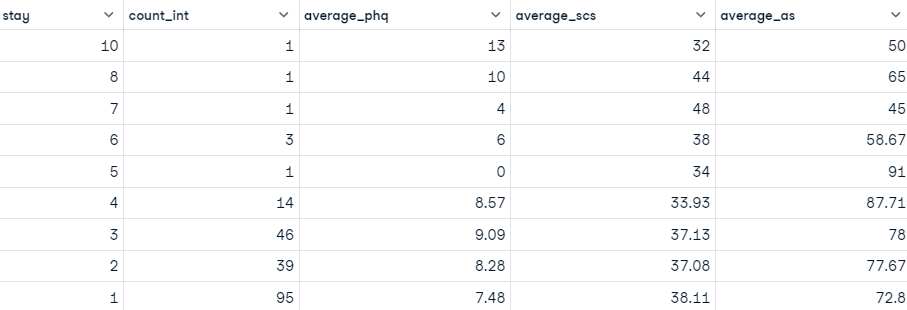Analyzing student's mental health
 venkatapraneeth marella
venkatapraneeth marellaProblem Statement:
Does going to university in a different country affect your mental health? A Japanese international university surveyed its students in 2018 and published a study the following year that was approved by several ethical and regulatory boards.
The study found that international students have a higher risk of mental health difficulties than the general population, and that social connectedness (belonging to a social group) and acculturative stress (stress associated with joining a new culture) are predictive of depression.
Explore the students data using PostgreSQL to find out if you would come to a similar conclusion for international students and see if the length of stay is a contributing factor
Below is the meta data for columns that are being analyzed
| Field Name | Description |
inter_dom | Types of students (international or domestic) |
japanese_cate | Japanese language proficiency |
english_cate | English language proficiency |
academic | Current academic level (undergraduate or graduate) |
age | Current age of student |
stay | Current length of stay in years |
todep | Total score of depression (PHQ-9 test) |
tosc | Total score of social connectedness (SCS test) |
toas | Total score of acculturative stress (ASISS test) |
Analysis :
To analyze the mental health of international students the following parameters could be the better measures
stay- study the effect of period of stay in foreign countries on mental healthtodep- analyze the total score of depression of international students, higher the score - higher is the effect on mental healthtosc- analyze the total score of social connectedness, lower the score - higher is the effect on mental healthtoas- analyze the total score of acculturative stress, higher the score - higher is the effect on mental health
As studying the effect of each student is not recommended and to get overall picture of mental health of students, it is good idea to group them according to the stay column and take aggregate of required measures as discussed above
SELECT stay,
count(stay) as count_int,
round(avg(todep),2) as average_phq,
round(avg(tosc),2) as average_scs,
round(avg(toas),2) as average_as
FROM students
WHERE inter_dom = 'Inter'
GROUP BY stay
ORDER BY stay DESC
LIMIT 10;
The order of execution in SQL is not the same order as we write the statements. So here the order of execution is:
fromwheregroup byselectorder bylimit
So from students table, we are filtering international students using where clause and then grouping the rows based on stay column, with average aggregation applied on columns todep, tosc, toas and count aggregation applied on stay column and accordingly aliased for better readability and understanding. After this, we ordered the rows in descending order based on stay column and limiting the number of display results to 10. The output of above SQL query is:

As the sample set in case of stay > 5 is very less, deducing conclusions from this data wouldn’t be ideal. Hence modifying the query accordingly to filter stay < 5 rows and adding column inter_dom to compare the measures between international and domestic students. The modified query is:
SELECT stay,
inter_dom,
count(stay) as count_int,
round(avg(todep),2) as average_phq,
round(avg(tosc),2) as average_scs,
round(avg(toas),2) as average_as
FROM students
GROUP BY stay,inter_dom
HAVING stay <= 4
ORDER BY stay DESC
LIMIT 20;
Output for the modified query is:

Inferences:
From query-1,
count_intcolumn, we can understand that mostly international students stay for the period of 2-3 years in foreign countries for educational needs and move back to their home countries after educationFrom query-2, we can infer that compared to domestic students, international students in general have higher
average_phqscores - indicating higher depression ratesFrom query-2, we can infer that compared to domestic students, international students in general have lower
average_scsscores - indicating lesser social interactions and connectionsFrom query-2, we can infer that compared to domestic students, international students in general have higher
average_asscores - indicating higher acculturative stress occurred due to change from one culture to other
Recommendations:
Educational organizations and government bodies can try to implement below recommendations for better well being of international students
Offer counseling services and employ counselors who have experience with diverse cultural backgrounds.
Create peer mentoring or buddy programs that pair international students with domestic students to help them integrate socially and provide emotional support.
Provide language assistance programs to reduce language-related stress.
Organize social events, cultural exchange programs, and workshops to encourage interaction between domestic and international students, promoting a more inclusive environment.
Run awareness campaigns specifically aimed at international students to reduce the stigma around seeking help and increase awareness of available mental health resources.
Create mental health hotlines or online chat services that are available 24/7.
Subscribe to my newsletter
Read articles from venkatapraneeth marella directly inside your inbox. Subscribe to the newsletter, and don't miss out.
Written by
